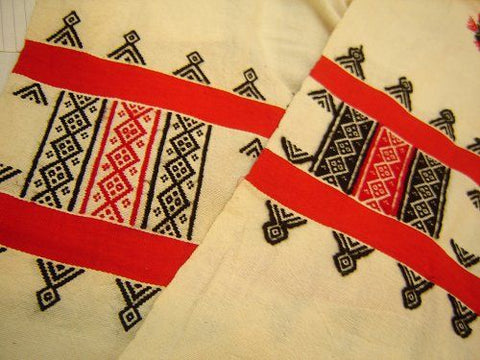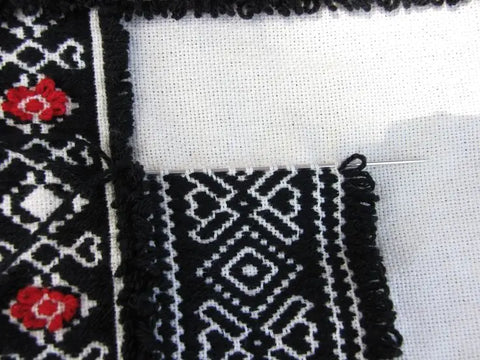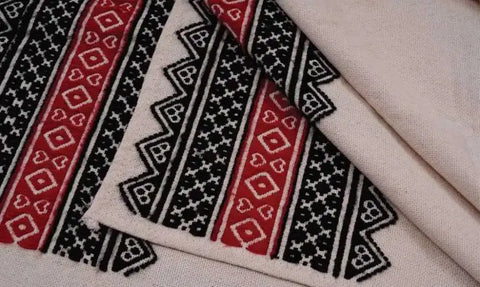Do you know every stitch has a story?
And that stands true for Toda embroidery of Tamil Nadu too. This art form of Tamil Nadu embroidery is locally called "Pukhoor" meaning flower. Toda embroidery is the unique craftsmanship of the women of the Toda pastoral community in Tamil Nadu's Nilgiris. Toda embroidery motifs have endured through a century of documented history to appear today in drapes, dupattas, tablecloths, stoles, kurtas, pyjamas, skirts, and jackets. In addition to these, traditional Puthukuli (shawl) is still considered to be a work of majesty.
The finely handcrafted Toda embroidery uses red and black threads on a white cotton background to give the impression of woven cloth. The intricate embroidery pattern has been passed down in the Toda tribe over the centuries. Ancient anthropological records also mention about Toda women engaged in this artistic endeavour on the western part of the Nilgiri plateau.
If you are interested in gaining some more insights into this beautiful art form then this blog is for you. Let’s delve into the history of this Tamil Nadu embroidery.

An Overview Of The Toda Community
Before going into the details of Toda embroidery artwork, first explore the tribal community that brought this craft into reality. Toda is a pastoral tribe present in the Nilgiri hilly region of south India. The Toda people are distributed across the grassland slopes in communities of three to seven small thatched cottages. These buildings are typically constructed on a timber structure and feature an arched roof shaped like a half barrel. The Toda and other ethnic groups, such as the Kota, Badaga, and Kurumba, coexisted locally before the 18th century and the British conquest. Todas thought that the first Toda man was created by Teikirzi and after that, they had first produced the sacred buffalo. From the right rib of the first Toda man, they are said to have generated the first Toda woman.
One of the most notable aspects of Toda culture is the buffalo's sacred status. The Toda tribe is centred around farming and the natural world. Their religion is centred around buffaloes and their milk, and their dairies are respected as temples. In this tribe, polyandry is a common practice in which multiple men typically brothers share a single wife. One of a Toda woman's husbands ceremoniously gifts her a toy bow and arrow when she becomes pregnant, claiming to be the social father of their children. In the 20th century, a separate Toda community converted to Christianity.
Designs Of Toda Embroidery
By counting the threads, Toda embroidery designs are carved. The Toda embroidery has intricate designs that are reminiscent of the tattoos that the Toda men and women once had. The stitching is so fine that it almost seems like weaving. Reversible embroidery features three stripes namely two red and one black woven into a balanced weave pattern on unbleached white cotton.
Toda embroidery patterns generally feature heavenly bodies (such as the Sun and Moon), reptiles, animals, and buffalo horns. They are done in crimson and black colours, even if their preferred subject matter is linked floral motifs. Everywhere on the edge of the embroidered fabric are depictions of rabbit ears. Honouring their first priest is another popular design that features black triangles arranged in a box. Women who are involved in embroidery work dedicate their artwork to nature. You can look at the significance of Toda crafts that a deceased person is buried after being covered in a traditional pattern embroidered fabric. In his 1937 work, noted Toda language linguist Murray Emeneau referred to nine different Toda embroidery designs
.
Process Of Toda Embroidery
The words "kuty" or "awtty," which mean "stitching," and "kutyvoy," which refer to the embroidered item, are the local phrases used to characterise the Toda embroidery work. Materials utilised in this piece are artificial needles, woollen black and red threads, occasionally blue threads, and loosely woven white cloth. The material is half-white, coarsely bleached cotton cloth with bands woven into it. The bands are six inches apart and are made up of two bands: one in black and one in red. The embroidery is done with a single-stitch darning needle and is restricted to the area inside the bands.

Instead of using an embroidered frame, the reverse stitch method is used to count the warp and weft on cloth with a homogenous structure. A small amount of tuft is purposefully allowed to protrude throughout the needle stitching procedure to highlight the embroidered fabric's rich texture. Counting the warp and weft of the fabric used for embroidery produces a geometric design. Toda embroidery designs have an affinity for the natural world and the cycle of life.
The Demand Of Toda Embroidery In The Indian Market
In 2012, Toda embroidery received the tag of Geographical Indication (GI). The younger generation of Todas is currently gravitating towards the contemporary urban lifestyle. They are still dressed in the customary clothes. With the better blend of modern look and customary craftsmanship, Toda embroidery of Tamil Nadu results in higher demand in the Indian market. But how long this unique and creative embroidery craft survives will depend on how it interacts with the outside world. To promote this craft across the country, various stakeholders have contributed enough through their initiatives.
The Tamil Nadu government operates the "Todas Handicraft Sale Emporium" which aids in the promotion of these embroidery products. This craft has taken a new face thanks to the Ambedkar Hastashilp Vikas Yojana (AHVY) which is run by the Ministry of Textiles, Government of India's Office of the Development Commissioner (Handicrafts). Promotional efforts are being carried out by the Nilgiri Adivasi Welfare Association (NAWA) to encourage Toda women to produce embroidered products. Nilgiri Hills specialises in marketing, design development, and organising handicraft exhibitions and other promotional activities to support the preservation of Toda embroidery art and the advancement of women's empowerment.
Conclusionary Thought
For Toda embroidery work, there are no pattern books available. The designs are a reflection of the Toda women's creativity, as they visualise a pattern before transferring it onto fabric. The majority of the inspiration comes from the Nilgiris' natural surroundings, routine activities, legendary tales, and vibrant flora and fauna. To wear such a unique and tribal hand Tamil Nadu embroidery, visit the iTokri e-commerce platform. Here you can explore a wide range of embroidery works in different fabrics that are a true reflection of the rich history of Indian embroidery.

FAQs
Why Toda embroidery is unique?
Toda embroidery is unique due to its sewing pattern as it does not utilise a frame to make patterns. In this craft, the fabric is stretched by hand.
Is Toda embroidery a dying art form?
Yes, Toda embroidery is a dying art form of the tribal community. With the efforts of various stakeholders, this embroidery art is patronised and promoted to preserve this craft.
Are there variations in Toda embroidery designs?
There are variations in Toda embroidery designs and motifs including huts, arrow-shaped, diamond-shaped, heart-shaped designs, and more.
 Verified Purchase
Verified Purchase









































































































































































































Leave a comment (all fields required)